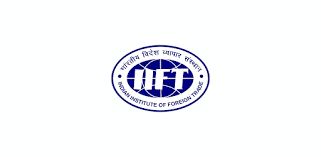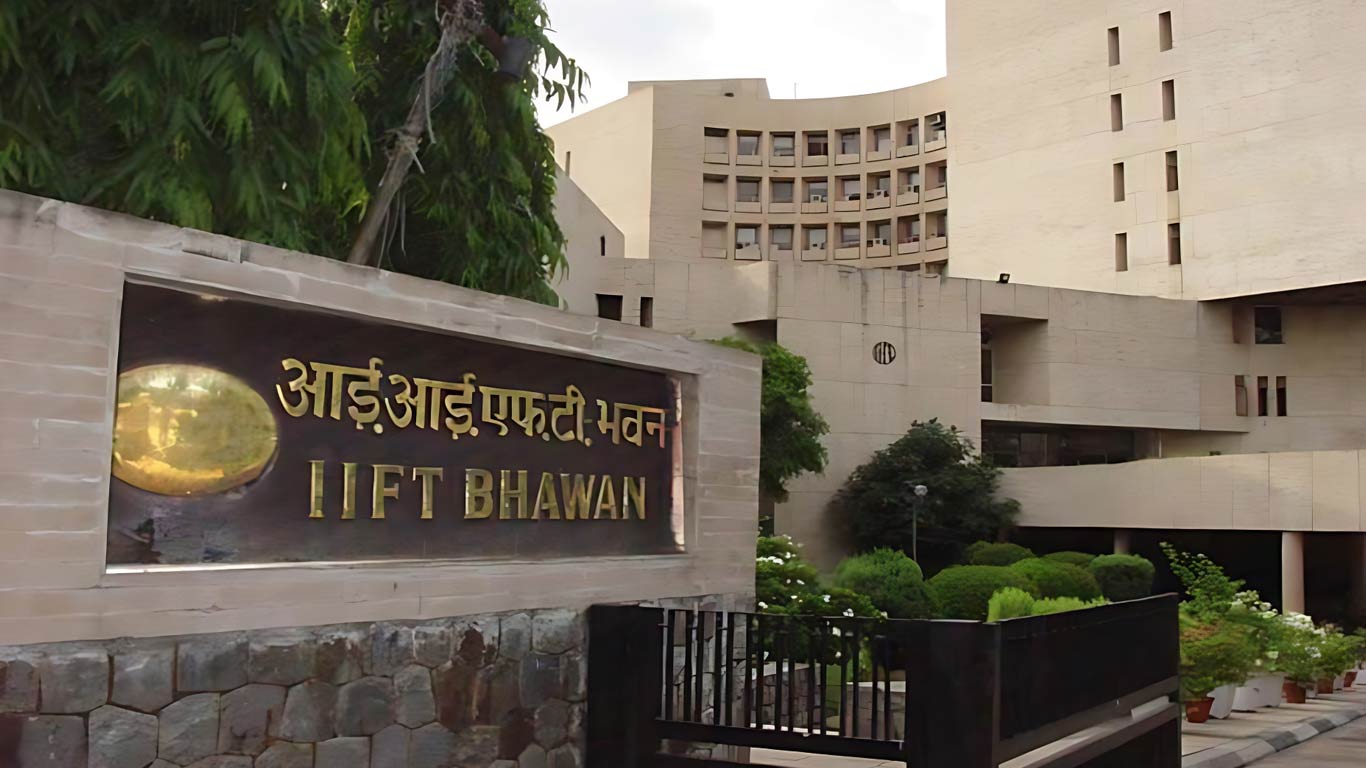- Overview
- Courses & Fees
- Admissions
- Placements
- Infrastructure
The Indian Institute of Foreign Trade (IIFT) Delhi, laid out in 1963, is one of India's chief business colleges, represent considerable authority in global exchange and business the board. Situated in the core of New Delhi, IIFT flaunts an energetic ground with best-in-class offices helpful for learning and exploration.
IIFT Delhi offers various projects remembering the lead MBA for Global Business (MBA-IB), Chief Projects, Ph.D. programs, and a few declaration courses. The organization is prestigious for its thorough educational plan, which consolidates hypothetical information with commonsense bits of knowledge into the worldwide business climate. The workforce involves experienced academicians and industry experts who give a mix of scholastic meticulousness and industry importance.
The grounds highlight current homerooms, a very much loaded library, PC labs, and committed research places. IIFT likewise has solid worldwide linkages, teaming up with different worldwide foundations and partaking in understudy trade programs.
The understudy life at IIFT is dynamic, with various clubs and social orders that empower initiative, advancement, and business venture. The establishment sorts out a few public and worldwide occasions, courses, and meetings, giving understudies sufficient chances to organize and gain from industry pioneers.
IIFT Delhi's graduated class network is broad and compelling, with graduates standing firm on key footholds in driving associations around the world. The foundation's emphasis on greatness in training and exploration keeps on going with it a top decision for hopeful business pioneers.
| Course | Fees | Eligibility |
| MBA | ₹21.77 Lakhs (Total Fees) | Graduation with 50% |
| MA | ₹4.1 Lakhs (Total Fees) | Graduation |
| Executive | ₹4.45 Lakhs (Total Fees) | Graduation with 55% |
| Diploma | ₹4.5 Lakhs (Total Fees) | Graduation |
| Certification | ₹75,000 (Total Fees) | Graduation |
| PG Certificate | ₹1.4 Lakhs (Total Fees) | Graduation |
| Ph.D | ₹65,000 (Total Fees) | Post Graduation with 55% |
IIFT Delhi admission procedure is rigid and holistic to enroll the deserving students for the MBA in International Business (MBA-IB) course and other equivalent programs offered at institute level. Here's an overview of the process for various programs: Here's an overview of the process for various programs:
www.iift.ac.in
MBA in International Business (MBA-IB):
Eligibility:
Applicants should have obtained an accepted qualification, that is a bachelor’s degree of not less than 3 years in duration in any field.
Reservations for final year graduation students may also be accepted if they are to complete all their necessary academic work by a given date.
Entrance Exam:
IIFT Entrance Test: To get admission into the college the students must write the IIFT entrance test, which is usually conducted in the month of December. It includes the areas of mathematical skills, ability to analyze data, to reason logically, verbal skills, and knowledge of current events.
Shortlisting for Second Round:
Candidates are also pre-selected depending on their performance in the entrance exams that are conducted as part of the entry requirements for the university.
Written Ability Test (WAT), Group Discussion (GD), and Personal Interview (PI): Written Ability Test (WAT), Group Discussion (GD), and Personal Interview (PI):
Select candidates go through WAT, GD, and PI that are or can be held in major cities in India.
WAT evaluates the candidate’s writing ability, more specifically, the way they write on a particular topic.
GD also measures interpersonal communication, ability to work in a team, time management and up to date information.
PI in determining overall personality, leadership profile and program suitability.
Final Selection:
The last process involves a compilation of the scores and ranks obtained in entrance tests and WAT, GD, PI, academic achievements, work background, and other factors.
Executive Programs:
Eligibility: Three to five years’ work experience is required together with prior managerial experience.
Membership in pharmaceutical Society of Kenya, Certificate of registration from the Pharmacy and poisons board.
Application Process:
Most organizations accept online application forms and supporting documents such as academic transcripts, work experience certificates, etcetera.
Entrance Exam/Interview:
A few programs may involve tests and / or interview as part of the screening process to select qualified candidates for training.
Ph. D. Programs
Eligibility:
Degree or its equivalent in related fields from a recognized university with not less than 55% marks for having been awarded First Class.
Candidates with MBA/master's degree holder preferably in Management/Commerce/Economics/Science/Engineering/Technology or any other related field.
Entrance Exam:
They must pass IIFT Research Entrance Test (RET) Candidates undergoing to study mgt must clear IIFT Research Entrance Test (RET).
(entry-level) The Institutional policies are as follows Candidates already having qualifications of UGC-NET / JRF may be exempted from RET.
Personal Interview:
Applicants are invited to an interview to establish whether they satisfy their research ability and admission to the program.
Key Points:
Application Deadlines: Organizational characteristics on this point, it is essential to adhere strictly to the application deadline. These are normally stated on the IIFT official website.
Documentation: Another requirement includes transcripts, entrance tests, mark-sheets, work experience, identity proof and filled application forms and fee.
Preparation: It is also relevant that the contests selecting candidates for HEI are rather stiff, that is why the preparation for the entrance exams and interviews is best done thoroughly.
The placement process at the Indian Institute of Foreign Trade (IIFT) Delhi is meticulously structured to ensure that students secure excellent career opportunities. Here's an overview of the placement process:
Pre-Placement Activities:
Training and Workshops: IIFT conducts workshops on resume building, interview skills, and group discussions. Mock interviews and aptitude tests are also part of the training.
Company Presentations: Companies conduct pre-placement talks (PPTs) to explain their business, job roles, and career progression opportunities.
Registration and Application:
Registration: Students register with the Placement Committee and submit their resumes.
Application to Companies: Students apply to companies that align with their career interests.
Selection Process:
Aptitude Tests: Many companies start with an aptitude test to shortlist candidates based on quantitative, verbal, and logical reasoning skills.
Group Discussions (GDs): Shortlisted candidates participate in GDs to assess their communication, leadership, and teamwork abilities.
Interviews: Candidates go through multiple rounds of interviews, including technical and HR interviews, to evaluate their fitness for the role and company.
Offer and Acceptance:
Job Offers: Companies extend job offers to be selected candidates.
Acceptance: Students accept offers based on their preferences and career goals.
List of Companies
- Consulting:
- McKinsey & Company
- Boston Consulting Group (BCG)
- Bain & Company
- Deloitte
- KPMG
- PwC
- Finance:
- Goldman Sachs
- JP Morgan Chase
- HSBC
- Citibank
- Barclays
- ICICI Bank
- Technology:
- Microsoft
- Amazon
- IBM
- HCL
- TCS
- Infosys
- FMCG:
- Unilever
- Procter & Gamble (P&G)
- Nestlé
- ITC
- PepsiCo
- Coca-Cola
- E-Commerce and Retail:
- Flipkart
- Amazon
- Myntra
- Snapdeal
- Walmart
- Pharmaceuticals and Healthcare:
- Johnson & Johnson
- Novartis
- Cipla
- Dr. Reddy's
- Manufacturing and Logistics:
- Tata Steel
- Mahindra & Mahindra
- Aditya Birla Group
- Reliance Industries
IIFT Delhi provides a robust infrastructure that supports an enriching educational experience
1. Academic Facilities:
Classrooms: Equipped with modern teaching aids such as projectors, audio-visual systems, and smart boards.
Library: A well-stocked library with a vast collection of books, journals, research papers, and digital resources. It provides access to numerous online databases and e-journals.
Computer Labs: State-of-the-art computer labs with high-speed internet and the latest software to support learning and research activities.
2. Hostels:
Accommodation: Separate hostels for men and women with all necessary amenities such as Wi-Fi, common rooms, recreational facilities, and mess halls.
Recreational Facilities: Common areas equipped with TVs, indoor games, and reading rooms.
3. Sports and Fitness:
Sports Facilities: Facilities for cricket, football, basketball, badminton, and tennis.
Gymnasium: Well-equipped gymnasium for fitness enthusiasts.
Sports Clubs: Active sports clubs organizing various intra and inter-college tournaments.
4. Health and Wellness:
Healthcare: On-campus medical facilities with qualified medical staff available for emergencies.
Counseling Services: Professional counseling services for mental health support.
5. Innovation and Entrepreneurship:
Incubation Center: Dedicated centers to support innovation and entrepreneurship, providing mentorship and resources for start-up ventures.
Research Centers: Specialized centers for research in international trade, logistics, and supply chain management.
6. Dining and Shopping:
Cafeterias: Multiple dining options offering a variety of cuisines.
Shopping Complex: Convenience stores and shops within the campus for daily needs.
.png)

